8+ Top-Rated Shopify Privacy Policy Generators Online
You will need a privacy policy when you first launch your business website, regardless of whether you are an individual, agency, or corporation. You may inadvertently overlook it, but a privacy policy is useful for protecting you from potential legal risks and establishing your market credibility. Some nations even require it as a prerequisite for conducting business.
The costs for a writtecustom policyn by legal professionals are quite high, especially if you also need to allocate funds for other concerns. Here, privacy policy generators are useful for streamlining the process with minimal expenditures. This article will walk you through the fundamental components of a privacy policy and provide guidance on how to select the best privacy policy generator for your business website.
Shopify’s Privacy Policy Generator
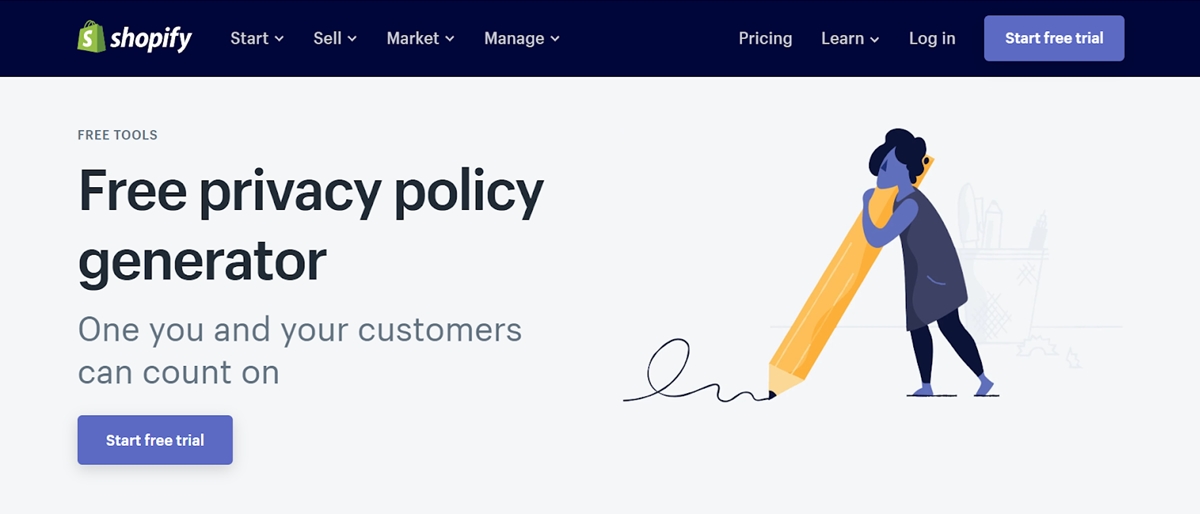
Shopify has always been popular as an e-Commerce marketplace, but in addition to being a well-known digital marketplace, it also offers a privacy policy generator to legalize your website. Whether you are a shop owner or a vendor, Shopify will do its best to support your business with a customized privacy policy.
Shopify's privacy policy generator is intuitive and easy to use, particularly for e-commerce websites. You only need to provide your business's name, physical address, email address, website's URL, and confirmation of cookie usage. The privacy policy template will then be emailed to you, and once you've made any necessary modifications, it will be ready for publication.
The fact that Shopify offers a free 14-day trial for testing purposes is a significant advantage. Shopify is not as comprehensive as other tools, and it uses the same template for all users, so it may not be the most optimal option. In addition, Shopify's policies are quite complex and stringent, which may increase your likelihood of breaking the law.
TermsFeed
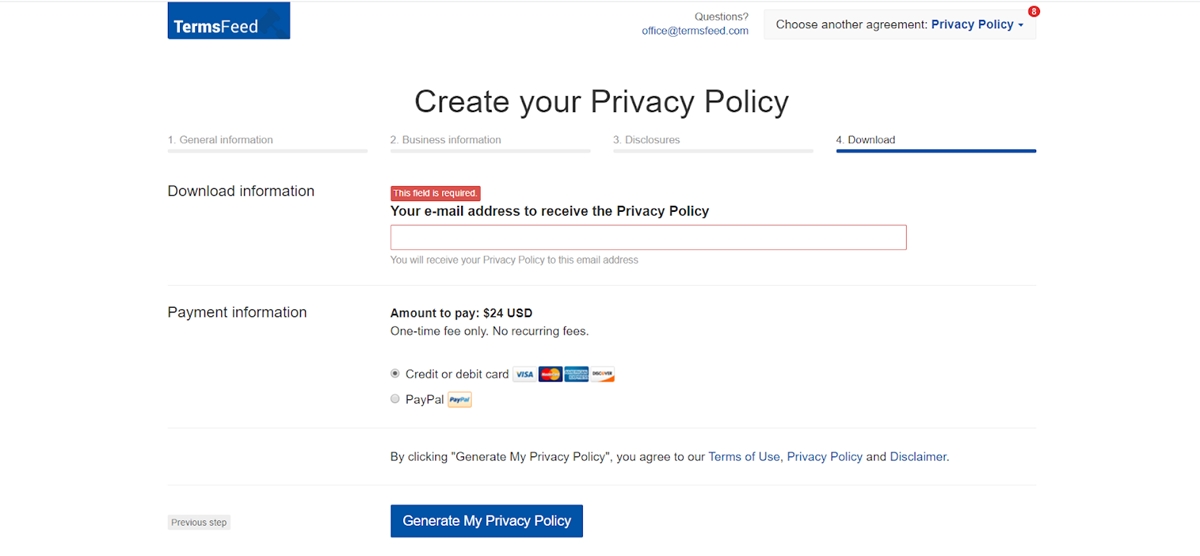
TermsFeed is one of the most popular privacy policy generators due to its usability and consistency. TermsFeed is available for use in all types of digital businesses, including e-commerce websites, mobile apps, and blogs, and it provides a variety of options ranges.
TermsFeed only requires four steps to generate a privacy policy. Simply enter the required information, such as general information, business information, and disclosures regarding how you collect and use user data, and then proceed to the checkout page to download the template. This effortless procedure yields an unexpectedly high-quality legal document.
Prices on TermsFeed are quite reasonable, with either free or paid documents available for your business website. You can save money by opting for a free basic policy, but we recommend paying an additional $30 to $70 to obtain full compliance with the international laws - GDPR and CalOPPA - and make your policy legally compliant. In addition, once you purchase a policy on TermsFeed, you will own it, which allows you to modify it as you see fit.
iubenda
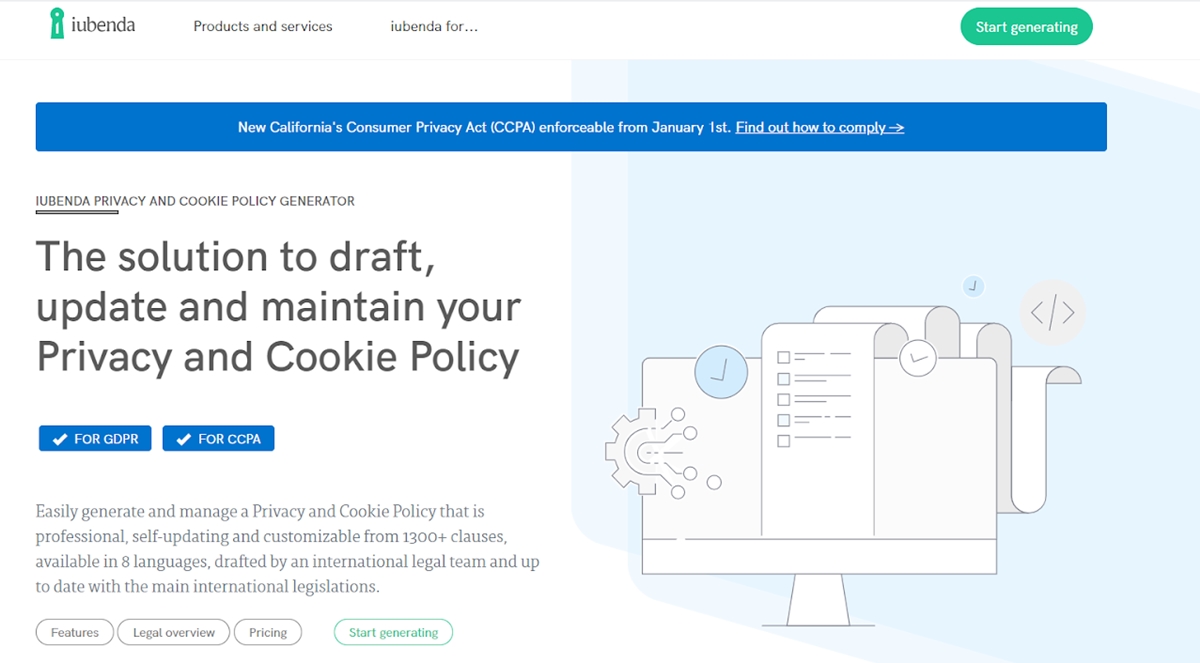
iubenda is one of the most highly regarded competitors on the list due to its superior policy statements, complete customization, and remarkable cookies privacy managing and generating services. The tool allows you to add up to 650 clauses that are crafted and tailored to your company's circumstances and operations by qualified professionals. If your business is a large organization that simultaneously processes the data of multiple users, then iubenda is the best option.
You're able to generate your privacy policy in eight distinct languages, which is convenient for regional publication. This tool generates privacy policies that are applicable across multiple platforms, from business websites to mobile apps. Additionally, iubenda is well-known for its efficient cookies policy generation system, which allows you to activate your cookies policy with a single click.
The operating system of iubenda is comparable to that of TermsFeed, but slightly more complex. The tool provides a high level of customization options, which may cause you to spend an inordinate amount of time on data entry. To add the policy to your company's website, you will need to use a "third-party" method, such as a link, widget, or text.
iubenda offers both free and paid options for generating privacy policies. The free option generates a standard and basic policy, but it is not compliant with international data protection laws. Consider the $27 per year annual subscription to ensure compliance with the most recent GDPR, CCPA, and CalOPPA regulations. However, even after purchasing the premium plan, you cannot directly copy and paste the policy onto your website; in other words, you are not the owner of the policy.
Free Privacy Policy Generator
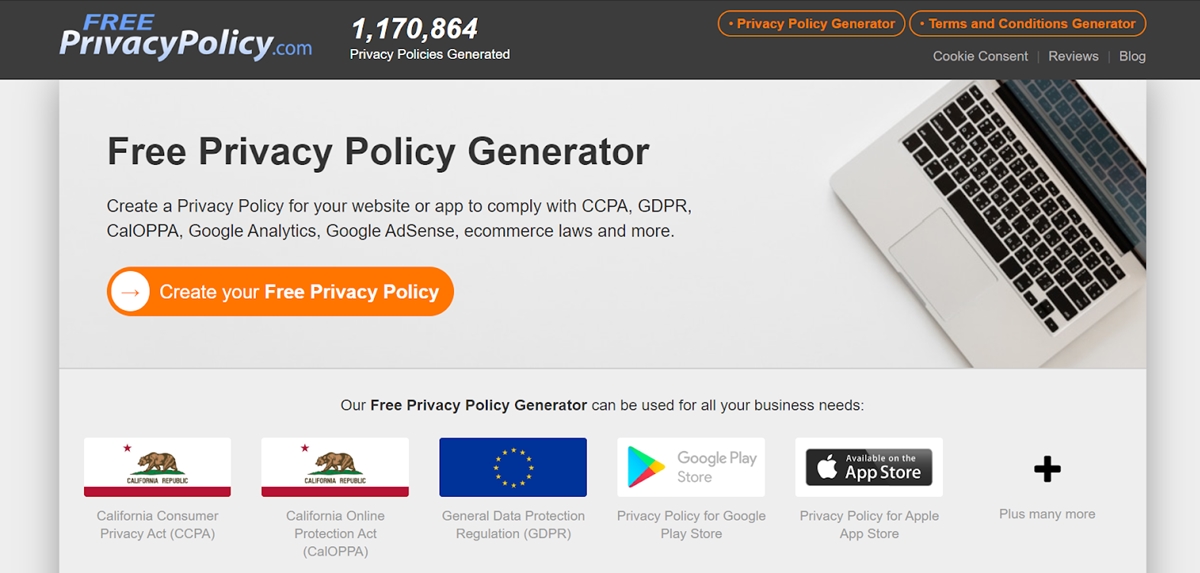
Regardless of what you anticipate, the Free Privacy Policy Generator will exceed your expectations. This privacy policy generator is capable of much more than its interface suggests. Over the years, Free Privacy Policy Generator has generated over 1,100,000 policies that are cohesive and highly legally compliant for a nominal fee, or even for free.
On this platform, generating privacy policies is relatively simple. All you need to do is fill out the (potentially lengthy) questionnaire with the requested information, and the tool will handle all other tasks automatically. You can also obtain a concise reference from the default examples and guides. There are free installation and add-on options, and you will only pay for the add-ons you require.
On the Free Privacy Policy Generator, there are both complimentary and premium payment options. The free version is largely law-compliant, but it lacks international documented laws such as the GDPR, CCPA, and CalOPPA sections as well as a few other essential clauses. You will need to spend more than $50 to "supply" your policy in full.
GetTerms.io
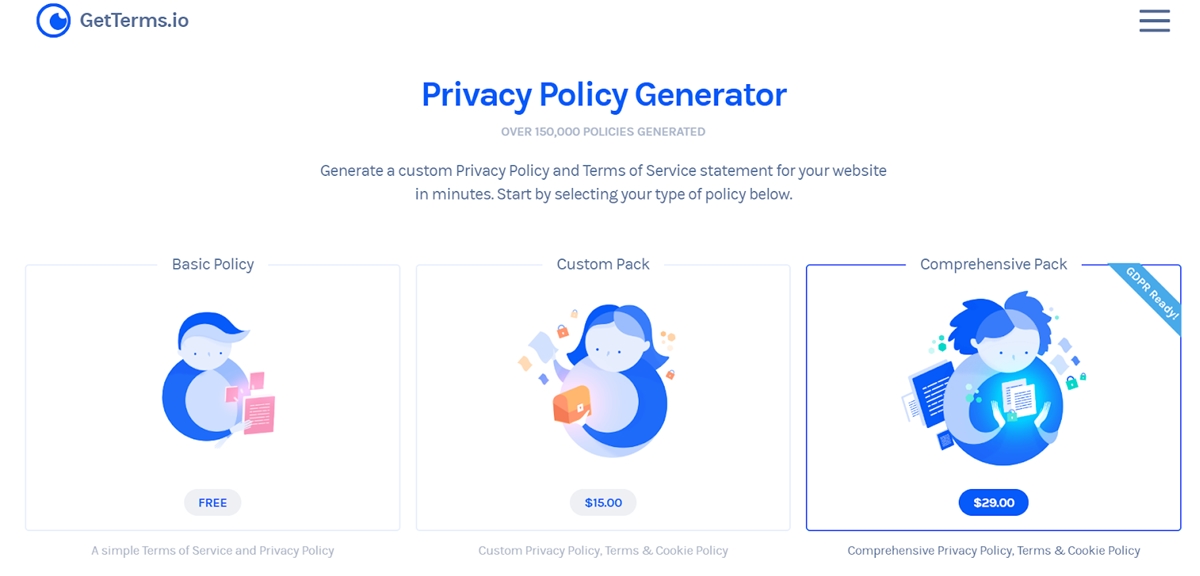
GetTerms is an ideal tool for generating privacy policies on a variety of platforms, such as blogs, freelance websites, mobile apps, e-commerce sites, and SaaS platforms.
The tool's user-friendly interface optimizes all information on a single page to simplify and expedite the policy creation process. Simply fill in the query fields, choose your preferred options, and the tool will automate the procedure for you.
Depending on your needs, you can choose from the basic, custom, or comprehensive package. The basic policy is free, but it does not address cookies and does not meet the requirements of international data protection laws. Other paid versions do include a cookies policy and numerous advanced features, but only the $29 comprehensive pack is GDPR-compliant.
3dcart
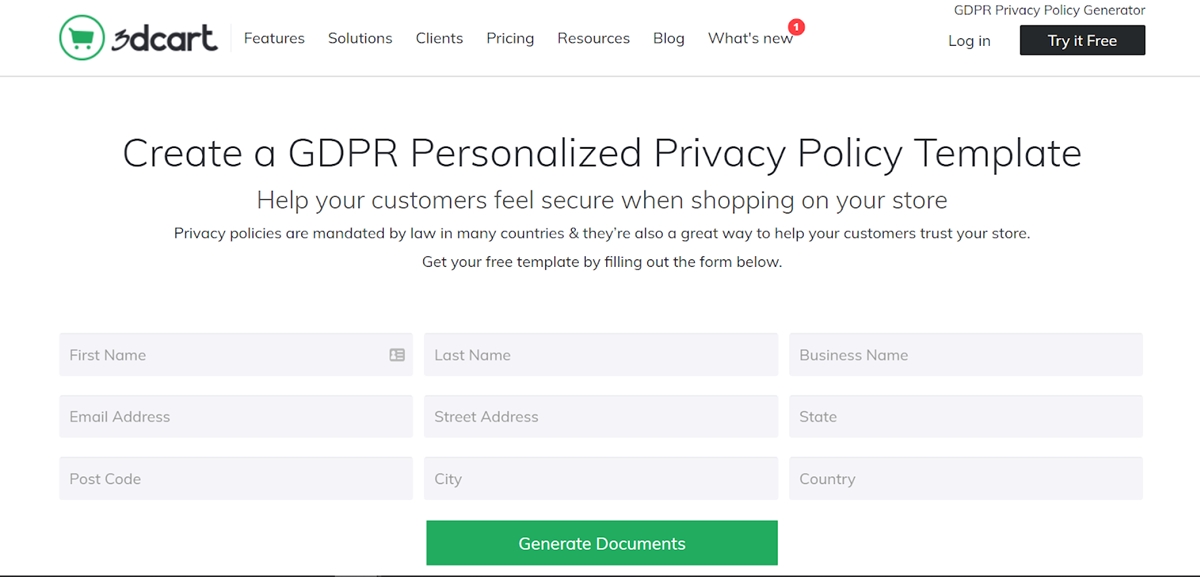
Similar to Shopify, 3dcart is an e-commerce platform with a privacy policy generator. In contrast to other platforms where you must pay extra money or subscribe to a premium plan to make your policy compliant with international law standards, 3dcart allows you to personalize your policy with a GDPR-ready template at no additional cost, making it easier for your business website to be legalized.
With 3dcart, all the required fields will be displayed on a single page. And once you have completed filling out the form, the tool will automatically generate a privacy policy template that you can edit, copy, and paste onto your website. 3dcart does not require an email address to access the policy, but it is necessary for your users or potential customers.
Firebase App Generator
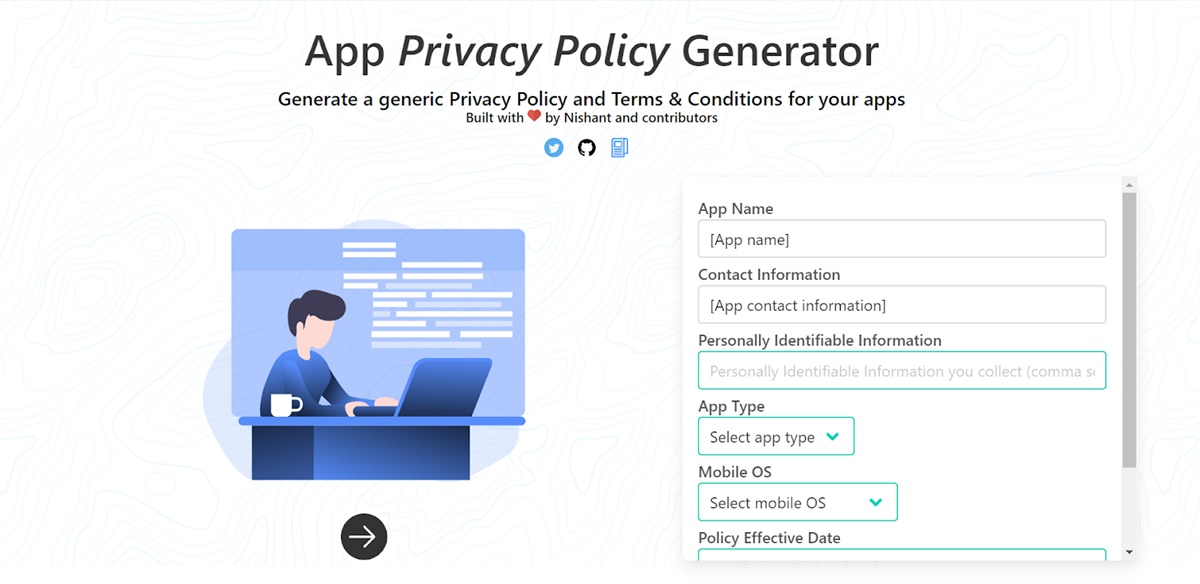
Firebase App Generator includes a tool for generating comprehensive privacy policies for the mobile apps you've developed.
This free tool's intuitive interface facilitates the optimization of the entire policy-generation process in a single location. Configuration and customization on Firebase are also simplified. In addition, since Firebase is a Google product, it supports link integrations with a variety of third-party services, including Google Play, Facebook, Admob, Fabric, and others.
However, in some instances, advantages could quickly become disadvantages. Due to the fact that Firebase only generates privacy policies for mobile apps, its target audience is restricted to web apps and websites. And because the application is free, it cannot guarantee a high level of security.
Termly
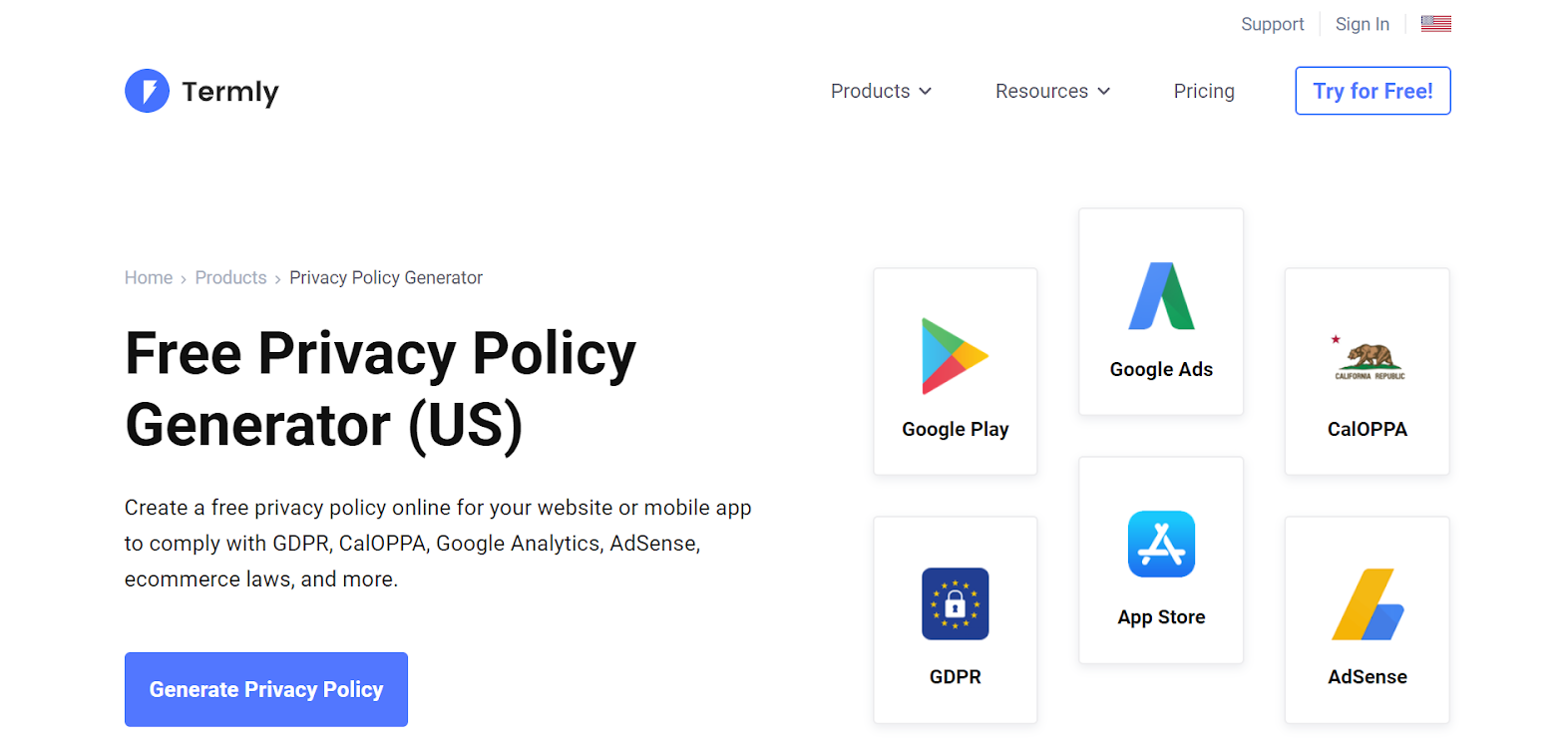
Termly is one of the most comprehensive privacy policy generators, regardless of whether you require a basic or law-compliant option. The generator is guaranteed to produce policy documents for any individual or business, including blogs, e-commerce websites, SaaS applications, Android apps, iOS app stores, and even Facebook.
The generation of privacy policies on Termly takes approximately 15 minutes. In addition, Termly helps you create a policy page that complies with international data protection laws and third-party platforms, such as GDPR, COPPA, CalOPPA, as well as Google Ads, Google Analytics, and Adsense, at no additional cost. In addition, your policies will be automatically updated whenever new legislation is introduced, so there is no need to worry about noncompliance.
Termly's pricing is relatively transparent. There are both free and paid alternatives available. If you want to add more compliance to your business, the Pro+ plan, which costs $10 per month, may be a better option than the free Basic plan. An annual subscription offers savings of up to 50 percent.
Privacy Policy Generator
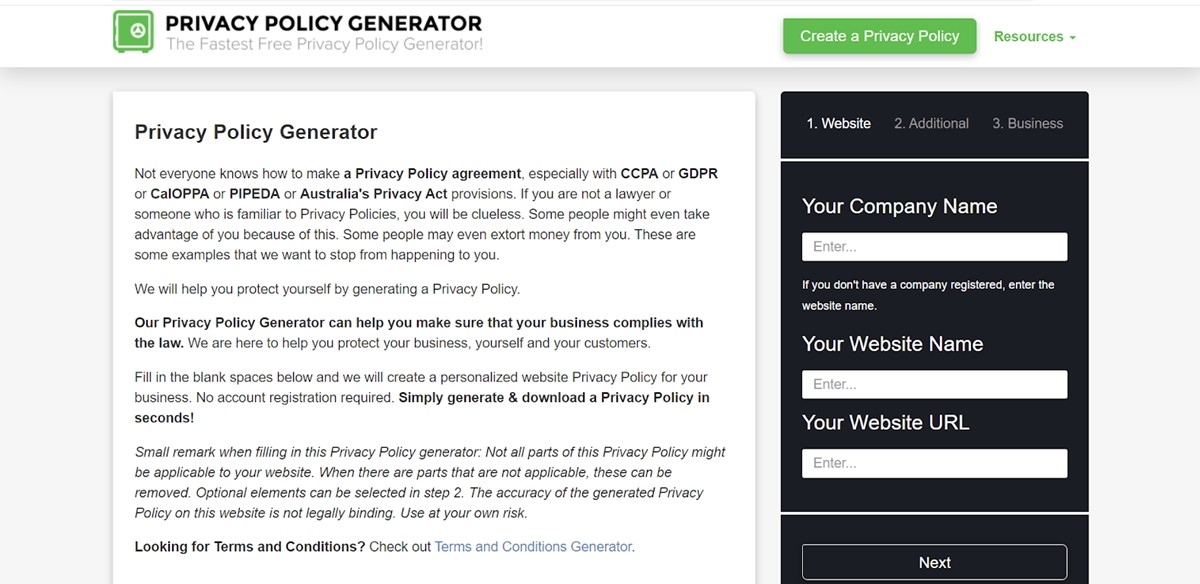
Privacy Policy Generator is a free and easy-to-use tool for quickly generating a privacy policy.
You will need to fill in nine blanks, which will take only a few minutes, before awaiting the result. You can create and download a customized privacy statement without registering for an account. Privacy Policy Generator also provides a preview of how your policy document will appear to provide you with a general idea.
Privacy Policy Generator generates privacy policies that comply with international privacy laws such as GDPR, CCPA, and CalOPPA. However, because the tool is free, the stated clauses may be insufficient, and you may need to add additional cohesive details to meet the requirements of GDPR and other applicable business laws.
Last words
There are numerous websites that provide free tools to generate a privacy policy document in a few minutes. But above and beyond having a privacy policy created with default automation, it is essential to consider what custom details can be added to your document to meet your business's requirements.
Regardless of which option you select, you should seek professional counsel to ensure that your privacy policy is legally standard and compliant. In addition, you should conduct thorough research on the legal requirements of your local area as well as the privacy laws of the country from which you intend to target your audience.
Comments
Post a Comment